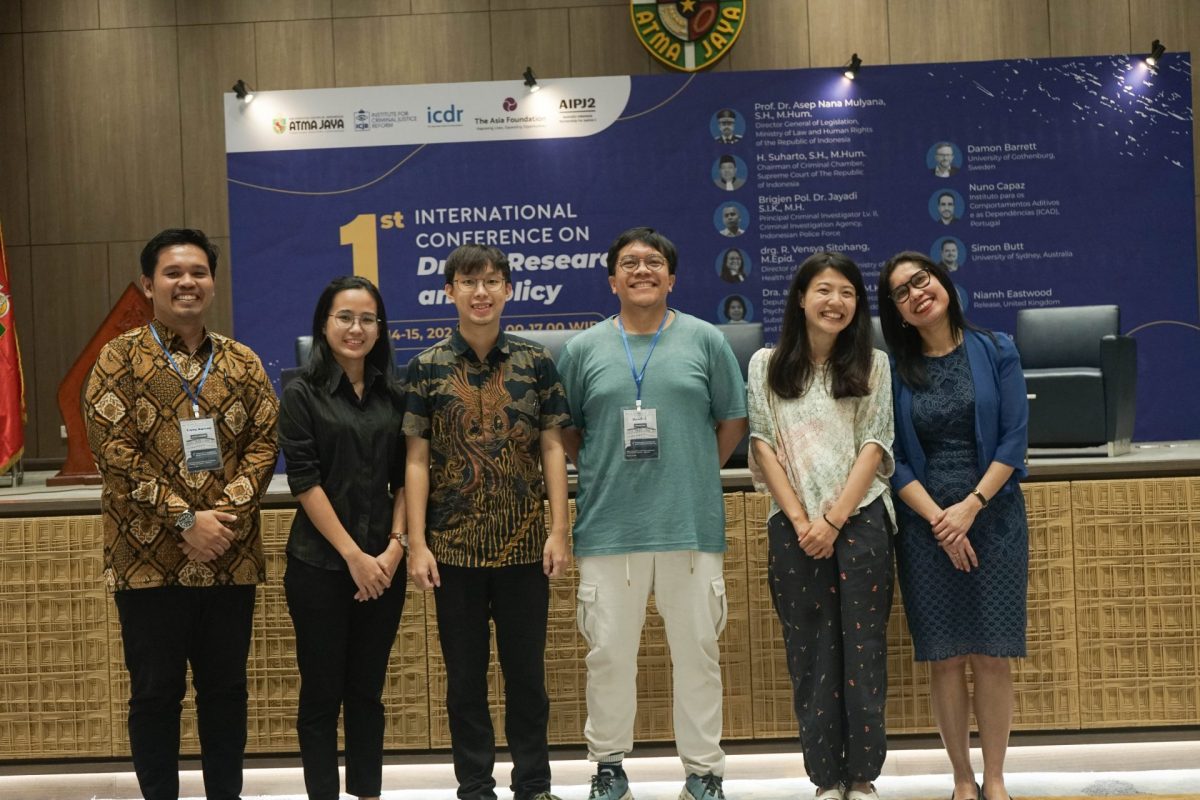Assistant Professor Chika Yamada and Program-Specific Assitant Professor Youdiil Ophinni (Hakubi Center for Advanced Studies) won the Best Oral Presenter Award at the International Conference on Drugs Research and Policy, held on May 14th and 15th at Universitas Katolik Indonesia Atma Jaya in Jakarta, Indonesia.
Awarded Presentation Title: Reimagining Harm Reduction Through its Genealogy in Indonesia
Awarded Date: May 15th, 2024
Conference HP:
International Conference on Drugs Research and Policy
Announcement of Award Winners:
https://www.youtube.com/live/lY-QoH8ivVY?si=gGxdVVW7uJllCeFz&t=9876
About the Conference
As the first of its kind in Indonesia, the International Conference on Drugs Research and Policy brings together academic researchers, governmental staff and policymakers, civil society groups, medical service professionals, and law enforcement agencies for constructive dialogue and knowledge sharing on issues related to drugs and drug policy. The two-day conference, hosted by Atma Jaya Catholic University of Indonesia and the Institute for Criminal Justice Reform, covered a variety of topics, including the colonial history of drug use and prohibition, a critical review of over-incarceration, gender-sensitive voices in policymaking, and the pharmaceutical efficacy of psychoactive herbs as painkillers and treatments for infectious diseases.
The conference is considered timely, following the heated discourse on reform for Indonesian narcotics law, last ratified in 2009. Narcotics law reform is becoming increasingly urgent due to the overcapacity of prisons from narcotic-related cases, in addition to wide-ranging contemporary problems such as mandatory and transactional rehabilitation, unmet needs in health rights for infectious diseases mitigation and mental health for the drug-using community, and the recent rejection by the Constitutional Court of Indonesia for the use of medical marijuana for cerebral palsy. The latter decision cited the “absence of evidence in comprehensive assessment and research on the use of substances…,” thus highlighting the urgency for more serious and focused research in the field of drug use and drug policy in Indonesia.
About the Presentation
Reimagining harm reduction through its genealogy in Indonesia
The dominant presentation of harm reduction (HR) in ongoing Indonesian drug policy reform rests on the premise that HR is monolithic, value-neutral, pragmatic, and necessarily counterbalances supply and demand reduction. Instead, we argue that HR is an evolving and socially constituted entity with varied—sometimes conflicting—ideologies. Through a post-structuralist lens, we narrate the genealogy of three intertwined HR practices: public health, legal, and liberatory, in the Indonesian context.
HR was pioneered by civil society in response to the AIDS crisis in late-1990s Indonesia. Facilitated by foreign donors, HR was presented as a fixed, amoral set of evidence-based methods benefitting public and global health, which successfully led to state-sanctioned programs in the mid-2000s. However, this technocratic approach has fostered an epistemic hegemony, which, in Foucauldian terms, undermines the ‘subjugated knowledge’ of people who use drugs, eventually reducing them to commodities and grassroots actors to implementing tools. Their collectivisation, however, galvanised scrutiny of the rights infringement of ‘criminals,’ prompting legal aid and advocacy to quell violence and exploitation during legal processes. Legal-focused HR led to restorative justice initiatives, which still aim for long-term abstinence to prevent future drug offences. Critical to the above contingencies, liberatory HR rejects value-neutrality and calls for radical structural changes, e.g., dismantling the justice system, reclaiming health agendas co-opted by donors and authorities, addressing intersectional injustices, and overturning neo-colonial knowledge generation. Importantly, they validate the pleasure and benefits of drugs based on bodily subjectivity and Indonesian historical perspectives.
We conclude that HR, in any form, has been fostered by a collective space for critical thinking—often nurtured by countercultures—that challenges the legitimacy of hegemonic knowledge. This ‘scientific citizenship’ is threatened by the status quo of bureaucratised HR practices. Incorporating HR into drug policy without understanding its diversified ideologies and their material-discursive effects could, paradoxically, create harm.
Message from the Award Winners
This presentation is based on our fieldwork with over 20 civil society organizations working on drug issues in Indonesia. We spent much time together over coffee and cigarettes, listening to their stories of old and their perspectives on the current situation.
The most gratifying part was presenting this work in the presence of those people from civil society organizations who shared their valuable experiences with us. The presentation contents were based on their tireless critical thinking and practice, and thus, the award belongs to them. We received various feedback immediately from the audience and during our chit-chat at cafes and their homes afterward, and we hope to incorporate their inputs into our future research. (Chika Yamada, Youdiil Ophinni)
Researcher Information
Chika Yamada Activity Database on Education and Research, Kyoto University
Youdiil Ophinni Activity Database on Education and Research, Kyoto University
Related Information
CSEAS NEWSLETTER (Interview)
Chika Yamada: Rethinking Public Health: Lessons from Indonesia’s Harm Reduction Movement
